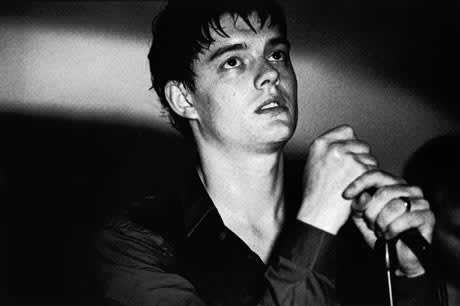The arrival of two Joy Division films at once is no coincidence. Though the two are only connected by subject matter (and now a distributor), each of these works presents an intimate portrait of one of modern musics most fascinating icons: Ian Curtis.
Control is the biopic, an immaculately envisioned piece of filmmaking by original Joy Division photographer and renowned music video director Corbijn. Based on the memoirs of Curtiss wife Deborah, its an extremely personal project for the filmmaker, who chose to shoot a straight, unbiased film to document Curtiss wild emotional breakdown. From his days working in the council job placement agency and forming the band with Peter Hook, Bernard Sumner and Stephen Morris after a Sex Pistols gig to the bands rise in Englands music scene and the discovery of Curtiss epilepsy, its a telling narrative thats given added significance by Corbijns insistence on shooting in high-contrast black and white.
Newcomer Sam Riley (of former indie band 10,000 Things) is Curtis incarnate from the haircut right down to the jerky signature dance, hes frighteningly perfect as Ian, even singing with his real voice. Indie vet Samantha Morton and Alexandra Maria Lara play the women in his life with the utmost precision. The former is Deborah, his forlorn wife left to care for their daughter Natalie, and the latter is Belgian mistress Annik Honoré, whose aloof cool helped propel Curtiss heart-breaking whirlwind. His quandary feels almost justified though, as Riley portrays a love-torn romantic instead of a brooding sulk, and Corbijn refuses to take sides, leaving the viewer to decide on the films morality.
Music fans will find Control wholly authentic; Matt Greenhalghs script includes such minute details as a cameo performance by punk poet John Cooper Clarke and a re-enactment of the tragic inspiration for "Shes Lost Control. And yet Control has enough emotive weight behind it to deeply affect any filmgoer, be it an obsessive goth or an unacquainted newcomer.
Geared more towards music fans is Grant Gees Joy Division, which works as a more informative profile and companion to Control. Gee uses his visual design expertise to carry the bands story, which is told through the eyes of Curtiss band-mates, the late Factory Records founder Tony Wilson (who signed the band), the bands graphic designer Peter Saville and a number of other key contributors.
Ian Curtiss story may end in darkness but this doc is filled with all sorts of amusing anecdotes (many of which are performed in Control), especially from the mouth of bassist Hook, who provides plenty of laughs with his spirited memories.
Vintage television footage and contrasting photos of Manchester then and now set up the films atmospheric lustre, while a rather stirring audio recording with Curtis under hypnosis further demonstrates the haunting allure this heartbreaking story still holds for the music world.
(Alliance Atlantis)Control is the biopic, an immaculately envisioned piece of filmmaking by original Joy Division photographer and renowned music video director Corbijn. Based on the memoirs of Curtiss wife Deborah, its an extremely personal project for the filmmaker, who chose to shoot a straight, unbiased film to document Curtiss wild emotional breakdown. From his days working in the council job placement agency and forming the band with Peter Hook, Bernard Sumner and Stephen Morris after a Sex Pistols gig to the bands rise in Englands music scene and the discovery of Curtiss epilepsy, its a telling narrative thats given added significance by Corbijns insistence on shooting in high-contrast black and white.
Newcomer Sam Riley (of former indie band 10,000 Things) is Curtis incarnate from the haircut right down to the jerky signature dance, hes frighteningly perfect as Ian, even singing with his real voice. Indie vet Samantha Morton and Alexandra Maria Lara play the women in his life with the utmost precision. The former is Deborah, his forlorn wife left to care for their daughter Natalie, and the latter is Belgian mistress Annik Honoré, whose aloof cool helped propel Curtiss heart-breaking whirlwind. His quandary feels almost justified though, as Riley portrays a love-torn romantic instead of a brooding sulk, and Corbijn refuses to take sides, leaving the viewer to decide on the films morality.
Music fans will find Control wholly authentic; Matt Greenhalghs script includes such minute details as a cameo performance by punk poet John Cooper Clarke and a re-enactment of the tragic inspiration for "Shes Lost Control. And yet Control has enough emotive weight behind it to deeply affect any filmgoer, be it an obsessive goth or an unacquainted newcomer.
Geared more towards music fans is Grant Gees Joy Division, which works as a more informative profile and companion to Control. Gee uses his visual design expertise to carry the bands story, which is told through the eyes of Curtiss band-mates, the late Factory Records founder Tony Wilson (who signed the band), the bands graphic designer Peter Saville and a number of other key contributors.
Ian Curtiss story may end in darkness but this doc is filled with all sorts of amusing anecdotes (many of which are performed in Control), especially from the mouth of bassist Hook, who provides plenty of laughs with his spirited memories.
Vintage television footage and contrasting photos of Manchester then and now set up the films atmospheric lustre, while a rather stirring audio recording with Curtis under hypnosis further demonstrates the haunting allure this heartbreaking story still holds for the music world.
